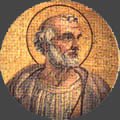Lesson
Introduction to the Papacy
The papacy is one of the oldest and most important institutions in the world, central to the Catholic Church. The Pope, as the Bishop of Rome, is considered the successor of Saint Peter, whom Jesus Christ appointed as the first leader of the Church. This lineage, known as apostolic succession, is the foundation of the Pope's authority and role.
Understanding the papacy is crucial for understanding the history and structure of the Catholic Church. The Pope serves as the spiritual leader for over a billion Catholics worldwide, guiding the faithful in matters of faith, morals, and Church teaching.
The Role and Responsibilities of the Pope
The Pope has many roles, including the supreme pastor and teacher of the Church. He is responsible for safeguarding and interpreting the deposit of faith, which is the body of revealed truth passed down from the apostles. The Pope also serves as a symbol of unity within the Church, striving to maintain harmony among diverse cultures and communities.
Other key responsibilities of the Pope include appointing bishops, approving new religious orders, and representing the Church in its relations with other religions and secular governments. The Pope also has the power to canonize saints, formally recognizing individuals who lived lives of heroic virtue and are models for the faithful.
How the Pope is Elected
The election of a new Pope is a significant event for the Catholic Church and the world. When a Pope dies or resigns, the College of Cardinals, composed of cardinals under the age of 80, gathers in a conclave in the Sistine Chapel in Vatican City. This gathering is secluded from the outside world to ensure the cardinals can vote freely and without external influence.
The cardinals cast their votes in secret ballots. A two-thirds majority is required to elect a new Pope. If no candidate receives the required majority, voting continues, sometimes for several days. Once a Pope is elected, he accepts the position and chooses a papal name. White smoke signals to the world that a new Pope has been chosen.
Popes Named Leo: A Legacy of Leadership
Throughout the history of the papacy, several Popes have chosen the name Leo. This name, meaning "lion," is often associated with strength, courage, and leadership. Many Popes named Leo have been significant figures in Church history, leaving a lasting impact on the Church and the world.
The choice of a papal name is a personal decision for the new Pope. It can reflect his admiration for a previous Pope, his devotion to a particular saint, or his vision for his pontificate. The repetition of the name Leo suggests a continuity of leadership and a desire to emulate the virtues of previous Popes who bore that name.
Significance of the Name "Leo"
Choosing the name "Leo" carries symbolic weight. The lion, a symbol of strength and royalty, often represents Christ and the Church itself. Popes who adopt this name may aim to project an image of strength in defending the faith and leading the Church. Furthermore, the historical prominence of previous Popes Leo, particularly Leo I, suggests an aspiration to achieve similar accomplishments.
While future lessons will delve deeper into the lives and accomplishments of individual Popes Leo, understanding the symbolism of the name itself provides valuable context. It highlights the aspirations and responsibilities associated with the papacy.
Pope Leo I: The Great
Pope Leo I, also known as Leo the Great, reigned from 440 to 461 AD. He is considered one of the most important Popes in history and is a Doctor of the Church. His pontificate was marked by significant theological contributions and strong leadership during a turbulent time in the Roman Empire.
Leo I played a crucial role in articulating the doctrine of the Incarnation, affirming the belief that Jesus Christ is both fully God and fully human. His writings and teachings helped to clarify this essential Christian doctrine and defend it against various heresies. He is also remembered for his courage in confronting Attila the Hun, persuading him to spare Rome from destruction.

Leo I's Impact
Leo the Great asserted papal authority and clarified core Christian beliefs. His writings on the two natures of Christ were crucial in the development of Christian doctrine and were affirmed at the Council of Chalcedon. He also worked tirelessly to maintain order within the Church and protect the city of Rome during a period of decline for the Roman Empire.
His legacy extended beyond his lifetime, influencing future Popes and shaping the course of Church history. Leo I's example of strong leadership, theological clarity, and pastoral care continues to inspire the Church today. Later Popes named Leo likely looked to him as a model for their own pontificates.












